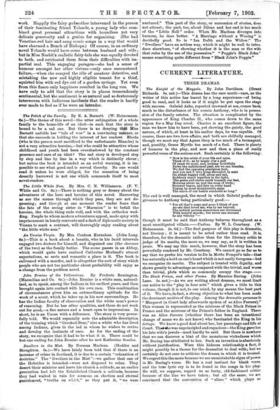Dwellers in the Mist. By Norman Maclean. (Hodder and Stoughton.
6s.)—We have lately been told that if there is an increase of crime in Scotland, it is due to a certain "relaxation of doctrine." The "Dwellers in the Mist "—we gather that one of the Hebrides is intended—were not disposed to relax. They desert their minister and leave his church a solitude, as an earlier generation had left the Established Church a solitude, because they had waited in vain for sermons on election and eternal pzudshment, "truths on which," as they put it, "we were nurtured." This part of the story, or succession of stories, does not attract; the part, too, about Dileas and her end is too much of the "Little Nell" order. When Mr. Maclean diverges into humour, he does better. "A Marriage without a Wooing" is decidedly good. So is "Ian Dubh and the Widow." The "Dwellers" have an artless way, which it might be well to intro- duce elsewhere, "of showing whether it is the man or the wife that rules by the use of the possessive." " Peg,gie's Black John* means something quite different from "Black John's Peggie."










































 Previous page
Previous page